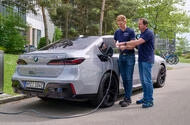BMW is making waves in the electric vehicle (EV) world by fitting its i7 model with a solid-state battery, a significant leap forward in battery technology. This move comes as the German automaker ramps up its testing of next-generation batteries, collaborating with Solid Power to explore the potential of all-solid-state batteries (ASSB). But what does this mean for the future of EVs, and why is solid-state technology considered the holy grail of battery innovation?
What Are Solid-State Batteries and Why Do They Matter?
Solid-state batteries differ from traditional lithium-ion batteries in that they use a solid electrolyte instead of a liquid one. This fundamental change allows for a denser energy storage solution, meaning that more energy can be packed into a smaller, lighter battery. Imagine being able to drive longer distances on a single charge without the added weight of bulky batteries. That’s the promise solid-state technology holds.
BMW’s prototype battery pack is designed to fit within the existing Gen5 architecture, utilizing prismatic cells in modules. This adaptation indicates that BMW is not only testing new technology but is also looking to integrate it into its current platforms sooner than expected. This is a strategic shift from earlier statements made by Martin Schuster, BMW Group’s vice-president of next-generation battery tech, who suggested that solid-state batteries wouldn’t be necessary until 2033. The fact that they are now actively testing this technology shows a commitment to innovation and responsiveness to market demands.
How Does This Impact EV Performance?
The implications of solid-state batteries for EV performance are profound. They offer greater capacity, which translates to longer ranges—potentially exceeding what we see with current battery technologies. Additionally, solid-state batteries are less susceptible to temperature fluctuations, making them more reliable in various climates. They also promise faster charging times, which could significantly enhance the convenience of owning an electric vehicle.
For instance, if BMW successfully integrates solid-state batteries into its lineup, we could see vehicles that not only travel farther on a single charge but also recharge in a fraction of the time it currently takes. This could alleviate one of the most significant concerns for potential EV buyers: range anxiety.
What’s Next for BMW and Solid-State Technology?
The BMW i7 equipped with solid-state technology will undergo extensive testing over the coming months. The focus will be on gathering data related to temperature and operating pressure, which are critical factors in battery performance and safety. This testing phase is crucial for identifying any potential issues before the technology is rolled out to consumers.
Moreover, BMW’s proactive approach reflects a broader trend in the automotive industry. Rivals like Mercedes-Benz are also exploring solid-state technology, with claims of nearing production readiness. This competitive landscape is likely to accelerate advancements in battery technology, benefiting consumers with better, more efficient vehicles.
The big takeaway? Solid-state battery technology isn’t just a futuristic concept—it’s becoming a reality faster than many anticipated. For consumers, this means that the electric vehicles of tomorrow could be lighter, more efficient, and capable of longer journeys. If you’re considering making the switch to electric, keep an eye on these developments. The future of driving is charging ahead, and it’s looking brighter than ever.

